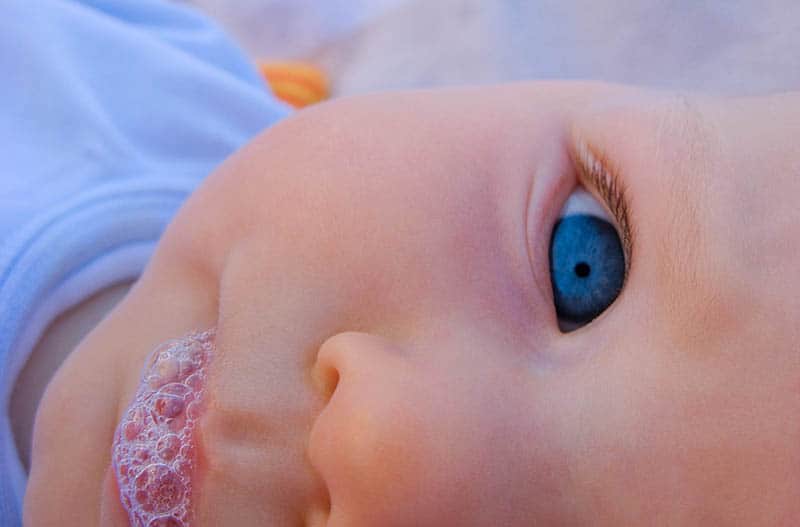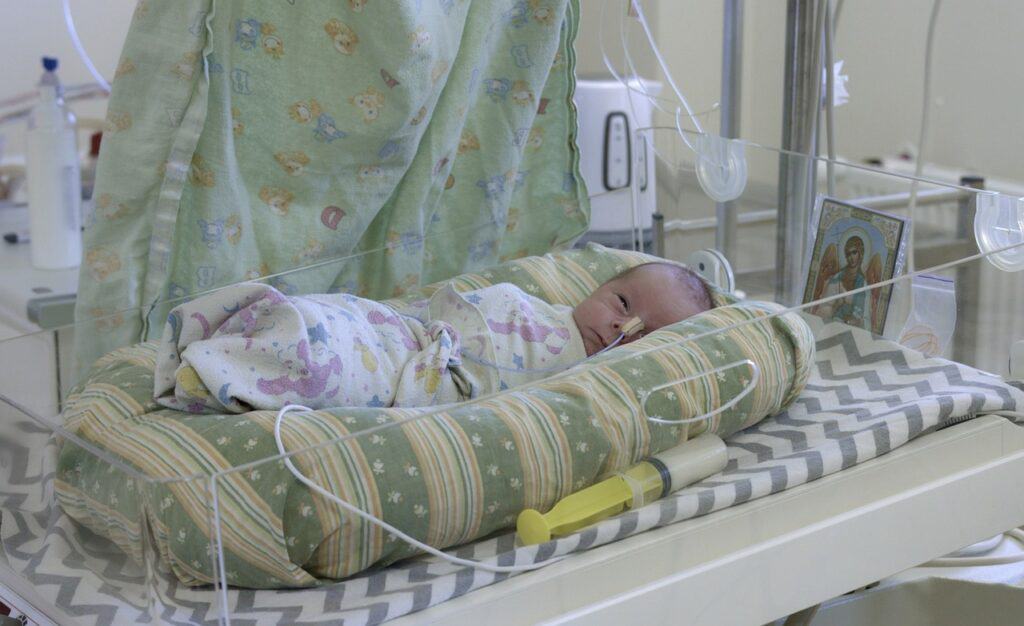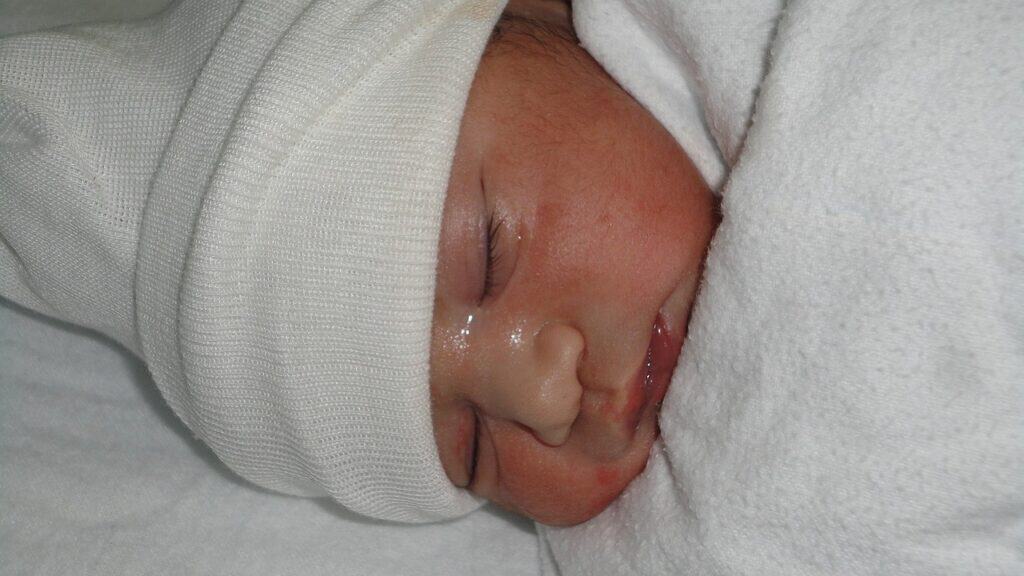Infant vomiting is a common occurrence and can be concerning for new parents. It is normal for babies to spit up or vomit after feeding, but Is It Normal for Babies to Throw Up Clear Liquid? Is this something to worry about?
Clear liquid vomit in infants can be caused by a variety of factors, including overfeeding, reflux, or a viral infection. It is important to understand the causes and symptoms of vomiting in babies to determine if medical attention is necessary.
Understanding when to seek medical attention is crucial in ensuring the health and well-being of your baby. In this article, we will explore the causes, symptoms, and treatments for vomiting in infants, and provide tips for home care and prevention.

Key Takeaways
- Clear liquid vomit in infants can be caused by overfeeding, reflux, or a viral infection.
- Symptoms to watch out for include lethargy, dehydration, and weight loss.
- If symptoms persist or worsen, it is important to seek medical attention.
1. Understanding Infant Vomiting

Vomiting is a common occurrence among infants, and it can be alarming for parents. While it is normal for babies to spit up or vomit occasionally, it is essential to understand the difference between normal spit-up and vomiting.
Spit-up is the expulsion of a small amount of milk or formula from the mouth, which is usually effortless and not forceful. On the other hand, vomiting is the forceful expulsion of stomach contents through the mouth.
Clear liquid vomit or regurgitation is not uncommon in babies, and it can be caused by a variety of factors. It can occur due to overfeeding, swallowing air while feeding, or gastroesophageal reflux disease (GERD), a condition in which stomach contents flow back into the esophagus.
In most cases, vomiting is not a cause for concern, and it tends to resolve on its own. However, if the vomiting is frequent, forceful, or accompanied by other symptoms such as fever, lethargy, or blood in the vomit, it is advisable to seek medical attention.
Parents can take several steps to prevent vomiting in infants, such as feeding the baby smaller, more frequent meals, burping the baby regularly during feeding, and keeping the baby upright for at least 30 minutes after feeding.
In conclusion, while it is normal for babies to spit up or vomit occasionally, parents should be aware of the signs of abnormal vomiting and seek medical attention if necessary. By taking simple precautions, parents can prevent vomiting in infants and ensure their baby’s health and well-being.
2. Causes of Vomiting in Babies
Vomiting in babies can be caused by a variety of factors, ranging from mild to serious. Here are some of the most common causes of vomiting in babies:
Reflux

Reflux, also known as gastroesophageal reflux or gastroesophageal reflux disease (GERD), is a common cause of vomiting in babies. Reflux occurs when the muscle that separates the stomach from the esophagus doesn’t close properly, allowing stomach acid to flow back up into the esophagus. This can cause discomfort and vomiting in babies.
Food Allergies

Food allergies can also cause vomiting in babies. Some babies may be allergic to certain foods, such as milk, soy, or eggs, which can cause them to vomit after eating.
Pyloric Stenosis

Pyloric stenosis is a condition that affects the muscles at the bottom of the stomach. In babies with pyloric stenosis, this muscle becomes thickened, making it difficult for food to pass through from the stomach to the small intestine. This can cause vomiting after feeding.
Infections

Infections, such as colds, ear infections, and urinary tract infections, can also cause vomiting in babies. In some cases, vomiting may be the only symptom of an infection.
Motion Sickness

Motion sickness can also cause vomiting in babies. This can occur when a baby is traveling in a car or on a boat, for example.
Other Causes
Other possible causes of vomiting in babies include food poisoning, intussusception (a condition where one part of the intestine slides into another part), gastroenteritis (inflammation of the stomach and intestines), and meningitis (inflammation of the membranes surrounding the brain and spinal cord).
It is important to note that if a baby is vomiting frequently or has other symptoms, such as fever or dehydration, it is important to seek medical attention.
3. Symptoms and Signs to Watch Out For

When a baby throws up, it can be a sign of an underlying problem. It is important to observe the baby’s behavior and look for other symptoms that may accompany the vomiting. Here are some symptoms and signs to watch out for:
- Fever: A fever is a common sign of an infection. If a baby has a fever along with vomiting, it may be a sign of a viral or bacterial infection.
- Coughing: If a baby is coughing along with vomiting, it may be a sign of a respiratory infection.
- Diarrhea: Diarrhea along with vomiting can be a sign of a gastrointestinal infection.
- Difficulty breathing: If a baby is having difficulty breathing along with vomiting, it may be a sign of a respiratory infection or other serious condition.
- Crying without tears: If a baby is crying without tears along with vomiting, it may be a sign of dehydration.
- Drowsiness: If a baby is unusually drowsy along with vomiting, it may be a sign of a more serious condition.
- Headache: If a baby is experiencing a headache along with vomiting, it may be a sign of a more serious condition.
- Irritability or fussiness: If a baby is unusually irritable or fussy along with vomiting, it may be a sign of an underlying problem.
If a baby is experiencing any of these symptoms along with vomiting, it is important to seek medical attention.
4. Feeding and Vomiting

Babies commonly spit up or vomit, and it can be concerning for parents, especially if the vomit is clear. Clear liquid vomit is usually not a cause for alarm, but it is important to understand why it may occur.
One reason for clear liquid vomit is overfeeding. When a baby is fed more than their stomach can hold, they may vomit up the excess milk or formula. It is important to ensure that the baby is not being overfed and that they are being fed at regular intervals.
Another reason for clear liquid vomit is reflux. Reflux occurs when the muscle between the esophagus and stomach is not fully developed, causing stomach contents to flow back up into the esophagus.
This can cause the baby to spit up or vomit clear liquid. If reflux is suspected, it is important to speak with a healthcare provider for guidance on how to manage it.
Food intolerance can also cause vomiting in babies. If a baby is intolerant to a certain food, such as cow’s milk, dairy, eggs, fish, peanuts, shellfish, soy, tree nuts, or wheat, they may vomit after consuming it.
If a food intolerance is suspected, it is important to eliminate the food from the baby’s diet and speak with a healthcare provider for further guidance.
In conclusion, clear liquid vomit in babies can be caused by a variety of factors, including overfeeding, reflux, and food intolerance. It is important to monitor the baby’s feeding habits and speak with a healthcare provider if there are any concerns.
5. Dehydration and Weight Loss

When a baby throws up clear liquid, it can be a sign of dehydration. Dehydration occurs when the body loses more fluid than it takes in. This can happen if a baby is not getting enough breast milk or formula, or if they are losing too much fluid through vomiting or diarrhea.
Dehydration can lead to weight loss in babies. This is because the body is losing water and electrolytes, which can cause a decrease in body weight. It’s important to monitor a baby’s weight regularly to ensure they are getting enough fluids and nutrients.
In addition to weight loss, dehydration can also cause dry mouth and fewer wet nappies. A baby’s urine output should be monitored, and if there are fewer wet nappies than usual, it may be a sign of dehydration.
If a baby is showing signs of dehydration, it’s important to seek medical attention immediately. Treatment may include giving the baby fluids through a syringe or IV, and monitoring their weight and urine output.
Overall, it’s important to ensure a baby is getting enough fluids to prevent dehydration and weight loss. If a baby is throwing up clear liquid or showing signs of dehydration, seek medical attention right away.
6. Medical Treatment and Medication

If a baby is vomiting clear liquid, medical treatment may be necessary depending on the underlying cause of the vomiting. In some cases, medical intervention may not be required as the baby may be able to recover on their own with proper care and attention.
If the vomiting is caused by a viral infection or a bacterial infection, antibiotics may be prescribed to treat the infection. However, antibiotics are not always necessary and should only be prescribed if the infection is severe or if the baby is at risk of developing complications.
In some cases, surgery may be necessary to correct an underlying condition that is causing the baby to vomit clear liquid. This may include surgery to correct a blockage in the digestive system or to remove an obstruction.
Medications may also be prescribed to help alleviate symptoms of vomiting, such as anti-nausea medication. However, it is important to note that over-the-counter medications should not be given to infants without first consulting a healthcare professional.
It is important to follow the advice of a healthcare professional when it comes to treating a baby who is vomiting clear liquid. In some cases, home remedies or natural remedies may be recommended, such as increasing fluid intake or changing the baby’s diet.
However, it is important to note that these remedies should only be used under the guidance of a healthcare professional.
7. Home Care and Prevention

If your baby is throwing up clear liquid, there are several things you can do at home to help prevent it from happening again. Here are some tips:
Burping
Make sure you burp your baby after every feeding. This can help relieve any gas that may be causing your baby to throw up. Hold your baby upright against your chest and gently pat or rub their back until they burp.
Burp Cloth
Keep a burp cloth handy when feeding your baby. This can help catch any spit-up or vomit and prevent it from getting on your clothes or furniture.
Oral Rehydration Solution
If your baby is vomiting frequently, they may become dehydrated. Offer them small amounts of an oral rehydration solution, such as Pedialyte, to help replace lost fluids and electrolytes.
Drool
Some babies may vomit clear liquid due to excessive drooling. To prevent this, make sure you keep a bib on your baby and wipe their mouth frequently.
Overall, it is important to monitor your baby’s symptoms and contact their healthcare provider if you have any concerns.
8. Complications and When to Seek Medical Attention

In most cases, throwing up clear liquid is not a cause for concern, especially if the baby is otherwise healthy and showing no other symptoms. However, there are certain complications that can arise from persistent vomiting or other symptoms that may require medical attention.
One possible complication is dehydration, which can occur if the baby is not able to keep down enough fluids. Signs of dehydration include dry mouth, sunken eyes, decreased urine output, and lethargy.
If the baby shows any of these symptoms, it is important to seek medical attention immediately.
Another potential complication is swelling or bloating of the abdomen, which can be a sign of an underlying digestive issue. If the baby is experiencing persistent abdominal pain or discomfort, this may also be a cause for concern and should be evaluated by a healthcare professional.
In rare cases, throwing up clear liquid may be a symptom of pneumonia, a serious respiratory infection that can be life-threatening if left untreated. If the baby is experiencing difficulty breathing, chest pain, or a persistent cough, it is important to seek medical attention right away.
According to Mayo Clinic, it is generally recommended to seek medical attention if a baby under three months old is vomiting, or if a baby over three months old has been vomiting for more than 24 hours, is showing signs of dehydration, or has a fever of 100.4°F or higher. It is important to follow these guidelines and seek medical attention when necessary to ensure the health and well-being of the baby.
9. Understanding Baby’s Growth and Vomiting

Babies are known for their unpredictable behavior, especially when it comes to their eating habits. One common concern among parents is when their baby throws up clear liquid. While it can be alarming to see, it is usually not a cause for concern.
Appetite and Baby’s Growth
Babies have small stomachs and can often only tolerate small amounts of milk or formula at a time. As they grow, their appetite will increase, and they will be able to consume more food. It is important to remember that babies grow at different rates, and there is no set amount of food they should be consuming at any given time.
Growth and Lower Esophageal Sphincter
The lower esophageal sphincter (LES) is a muscle that separates the esophagus from the stomach. In babies, this muscle is not fully developed, which can cause them to spit up or vomit. As they grow, the LES will strengthen, and the vomiting will decrease.
Vomiting and Baby’s Health
While vomiting can be a normal part of a baby’s growth and development, it is important to monitor the frequency and amount of vomiting. If the baby is vomiting excessively or seems to be in pain, it may be a sign of a more serious condition, such as gastroesophageal reflux disease (GERD) or pyloric stenosis.
In conclusion, it is normal for babies to throw up clear liquid, but it is important to monitor their growth and health. If there are any concerns, it is always best to consult with a pediatrician.
Related Posts:
Frequently Asked Questions
What causes babies to spit up clear liquid?
Babies spit up clear liquid due to reflux, which is a common condition in infants. Reflux occurs when the muscle that separates the esophagus and the stomach is not fully developed. As a result, the stomach contents, including milk and stomach acid, can flow back up into the esophagus and out of the mouth.
Is it normal for babies to spit up white chunks?
Babies may spit up white chunks, which are usually milk curds. This is normal and nothing to worry about, as long as the baby is gaining weight and seems otherwise healthy.
When should I be concerned about my baby spitting up clear liquid?
If your baby is spitting up clear liquid frequently, seems to be in pain, is not gaining weight, or has other symptoms such as fever or diarrhea, you should consult with your pediatrician. These could be signs of a more serious condition, such as gastroesophageal reflux disease (GERD).
How can I prevent my baby from spitting up clear liquid?
There are several things you can do to help prevent your baby from spitting up clear liquid, including feeding smaller amounts more frequently, burping your baby frequently during and after feedings, keeping your baby upright for at least 30 minutes after feeding, and avoiding overfeeding.
What are the possible reasons for a baby to vomit mucus and milk?
A baby may vomit mucus and milk due to a cold or other respiratory infection, or due to a more serious condition such as pneumonia or bronchiolitis. If your baby is vomiting frequently and seems to be having trouble breathing, you should seek medical attention immediately.
What are the common causes of baby spit up with saliva bubbles?
Baby spit up with saliva bubbles is usually caused by excess saliva production, which is common in infants. This is not usually a cause for concern, unless the baby is spitting up excessively or seems to be in pain.

Iesha is a loving mother of 2 beautiful children. She’s an active parent who enjoys indoor and outdoor adventures with her family. Her mission is to share practical and realistic parenting advice to help the parenting community becoming stronger.
